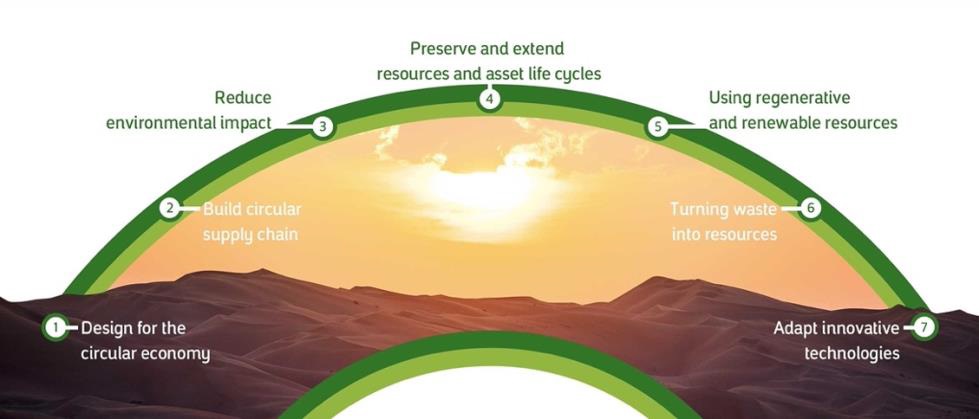The Kingdom of Saudi Arabia is embarking on a bold path to redefining its future, placing sustainability as a cornerstone for a thriving future. The Saudi National Vision 2030, underpinned by strong, forward-looking approach to embedding sustainability practices into the fabric of the Saudi society and economy, transcends beyond the conventional environmental initiatives to encompass a diversified economy, coupled with social welfare and governance reforms. This transformative shift not only positions the Kingdom as a globally competitive economic powerhouse with sustainability at the core, but also sets new benchmarks for the region and the world.
Vision 2030 lays a promising foundation for driving the circular transition in the Kingdom, promoting novel and innovative economic models that favor reuse, recycling and closed loops processes. While formal legislation and a national strategy for circular economy are still in development, momentum is building through pioneering circular economy initiatives. Across different sectors, governmental bodies as well as several organizations are paving the way, proving that a circular future for the Kingdom is not only possible but within reach.
Circular Carbon Economy (CCE) Framework:
During its presidency of the G20 in 2020, the Kingdom promoted the concept of the Circular Carbon Economy as a compelling and effective approach to address climate challenges through all available technologies across the “4Rs”—Reduce, Reuse, Recycle, and Remove. Spearheaded by the Ministry of Energy and key industry players, the framework fosters a balanced carbon cycle to help meet Saudi Arabia’s net-zero goal by 2060, as part of the ambitious Saudi Green Initiative
National Waste Management Initiatives:
The Saudi Green Initiative (SGI) is revolutionizing waste management practices across the Kingdom. Both the National Center for Waste Management (MWAN) and the Saudi Investment Recycling Company (SIRC) are leading a waste management transformation initiative as part of the SGI, aiming to divert 94% of waste generated in Riyadh away from landfills and compost more than 1.3 million tons of biodegradable waste by 2035. The initiative will result in a reduction of 4.1 mtpa of CO2e emissions and create a proven waste management model that will be implemented across the Kingdom. MWAN is also leading another initiative as part of the SGI to develop a National Waste Management Master Plan pioneering circular economy practices in the Kingdom by 2025.
Saudi National Industrial Strategy:
Within its National Industrial Strategy, the Saudi Ministry of Industry and Mineral Resources has introduced the Circular Economy as a one of the focus areas for several high-impact sectors, including construction materials, plastic and rubber, and mining industries. As part of this strategy, the Saudi Authority for Industrial Cities and Technology Zones (MODON) is currently leading an initiative within industrial cities to implement circular economy principles. This effort aims to enhance the efficient use of natural resources in manufacturing and improve process efficiency by integrating advanced technologies, ultimately contributing to waste reduction and recycling.
NEOM’s Oxagon City:
NEOM’s Oxagon, designed as the world’s largest floating industrial complex, embodies the Kingdom’s vision for regenerative, closed-loop urban and industrial ecosystems. Oxagon will combine Industry 4.0 and advanced circular economy technologies to establish a zero-waste, zero-emission environment. As a flagship Vision 2030 project, Oxagon will set new global standards for circularity in industrial development, proving that sustainable urban growth can be a reality.
SABIC’s TRUCIRCLE™ Initiative:
SABIC’s TRUCIRCLE™ initiative is setting a standard for plastic recycling in the Kingdom, aiming to process over 1 million metric tons of plastic waste. The TRUCIRCLE™ portfolio showcases circular innovation, offering circular and bio-based products that include mechanically recycled polymers, closed-loop initiatives, and designs for recyclability. SABIC’s efforts illustrate the potential for circular innovations in petrochemical industries, establishing an actionable model for responsible resource management.
Saudi Aramco’s Circular Economy Initiative:
As a cornerstone of the Saudi economy, Saudi Aramco is embedding circular practices within its operational DNA through its Circular Economy Taskforce, established in 2020. By incorporating seven key circular principles, Aramco is optimizing resources and minimizing waste at every level, from extraction to final production.

With each initiative, the Kingdom inches closer to a national circular economy strategy, backed by comprehensive legislation. Such a framework would unify and streamline efforts across all sectors, paving the way for organizations to adopt this transition and achieve an impact at scale. The Kingdom’s Leadership is setting the stage for a greener, more resilient future that promises lasting impact for generations to come. The momentum is undeniable; the potential, boundless.